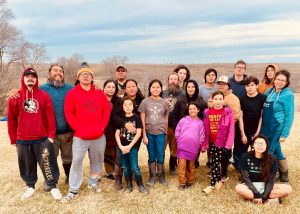
Great Plains Action Society was created in 2016 during the fight against the Dakota Access, a 1,172-mile underground pipeline that transports oil from North Dakota to Illinois, crossing near the Standing Rock Sioux Tribe reservation. GPAS originated as a resistance camp against the pipeline and later evolved into a broader platform to advocate for and fight for Indigenous land, rights, and sovereignty. Through legislative and policy advocacy, as well as community initiatives – including land rematriation, healing justice, representation, and arts programs – the organization serves Indigenous peoples across Iowa and Eastern Nebraska. They focus on a range of threats, including environmental degradation, systemic racism, and the ongoing impacts of colonialism. As a beacon for Indigenous-led activism, GPAS cultivates a movement for justice and healing in the face of entrenched systemic challenges to Indigenous land, health, and futures.

Members of the Great Plains Action Society at the Cold Moon Buffalo Harvest, at the Dunn Ranch Prairie. Photo: Great Plains Action Society
Six dedicated staff members, predominantly Indigenous, form the core of Great Plains Action Society. Their work primarily benefits Indigenous communities, addressing issues such as representation and rematriation – often referred to as “land back,” the process of returning Indigenous land to Indigenous people. They advocate against harmful CO2 pipelines and organize mental health support groups, while actively fighting for greater Indigenous representation in land management and opposing racist “Indian” mascots in Iowa sports. GPAS is currently purchasing over an acre of land in Iowa City to establish an Indigenous-led resilience and innovation hub which will feature classrooms, a community kitchen for Indigenous foods, and farming land. This space aims to foster communal healing through gardening and provide mutual aid by distributing produce to those in need. Additionally, GPAS plans to create a Land Trust that aligns with Indigenous ideologies of communal ownership, addressing the concerning fact that 98% of agricultural land in the U.S. is owned by white individuals.

Members of the Great Plains Action Society and others protest for reproductive liberation rights in Sioux City, 2022. Photo: Great Plains Action Society